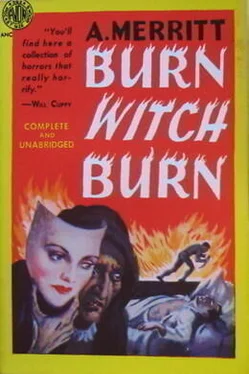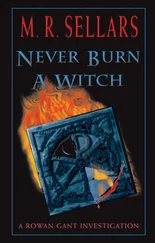The test was ordained to failure. Ricori was fully conscious, wide awake, his mind probably as alert and sane as ever. But the lines of communication were still down. His mind had been freed, but not his body. The paralysis persisted, forbidding any muscular movements except the deep–seated unconscious reflexes essential to the continuance of life. He could not speak. His eyes looked up at me, bright and intelligent, but from an expressionless face…looked up at McCann with the same unchanging stare.
McCann whispered: "Can he hear?"
"I think so, but he has no way of telling us."
The gunman knelt beside the bed and took Ricori's hands in his. He said, clearly: "Everything's all right, boss. We're all on the job."
Not the utterance nor the behavior of a guilty man—but then I had told him Ricori could not answer. I said to Ricori:
"You're coming through splendidly. You've had a severe shock, and I know the cause. I'd rather you were this way for a day or so than able to move about. I have a perfectly good medical reason for this. Don't worry, don't fret, try not to think of anything unpleasant. Let your mind relax. I'm going to give you a mild hypo. Don't fight it. Let yourself sleep."
I gave him the hypodermic, and watched with satisfaction its quick effect. It convinced me that he had heard.
I returned to my study with McCann. I was doing some hard thinking. There was no knowing how long Ricori would remain in the grip of the paralysis. He might awaken in an hour fully restored, or it might hold him for days. In the meantime there were three things I felt it necessary to ascertain. The first that a thorough watch was being kept upon the place where Ricori had gotten the doll; second, that everything possible be found out about the two women McCann had described; third, what it was that had made Ricori go there. I had determined to take the gunman's story of the happenings at the store at their face value—for the moment at least. At the same time, I did not want to admit him into my confidence any more than was necessary.
"McCann," I began, "have you arranged to keep the doll store under constant surveillance, as we agreed last night?"
"You bet. A flea couldn't hop in or out without being spotted."
"Any reports?"
"The boys ringed the joint close to midnight. The front's all dark. There's a building in the back an' a space between it an' the rear of the joint. There's a window with a heavy shutter, but a line of light shows under it. About two o'clock this fish–white gal comes slipping up the street and lets in. The boys at the back hear a hell of a squalling, an' then the light goes out. This morning the gal opens the shop. After a while the hag shows up, too. They're covered, all right."
"What have you found out about them?"
"The hag calls herself Madame Mandilip. The gal's her niece. Or so she says. They rode in about eight months since. Nobody knows where from. Pay their bills regular. Seem to have plenty of money. Niece does all the marketing. The old woman never goes out. Keep to themselves like a pair of clams. Have strictly nothing to do with the neighbors. The hag has a bunch of special customers—rich–looking people many of them. Does two kinds of trade, it looks—regular dolls, an' what goes with 'em, an' special dolls which they say the old woman's a wonder at. Neighbors ain't a bit fond of 'em. Some of 'em think she's handling dope. That's all yet."
Special dolls? Rich people?
Rich people like the spinster Bailey, the banker Marshall?
Regular dolls—for people like the acrobat, the bricklayer? But these might have been "special" too, in ways McCann could not know.
"There's the store," he continued. "Back of it two or three rooms. Upstairs a big room like a storeroom. They rent the whole place. The hag an' the wench, they live in the rooms behind the store."
"Good work!" I applauded, and hesitated—"McCann, did the doll remind you of somebody?"
He studied me with narrowed eyes.
"You tell me," he said at last, dryly.
"Well—I thought it resembled Peters."
"Thought it resembled!" he exploded. "Resembled—hell! It was the lick–an'–spit of Peters!"
"Yet you said nothing to me of that. Why?" I asked, suspiciously.
"Well I'm damned—" he began, then caught himself. "I knowed you seen it. I thought you kept quiet account of Shevlin, an' followed your lead. Afterwards you were so busy putting me through the jumps there wasn't a chance."
"Whoever made that doll must have known Peters quite well." I passed over this dig. "Peters must have sat for the doll as one sits for an artist or a sculptor. Why did he do it? When did he do it? Why did anyone desire to make a doll like him?"
"Let me work on the hag for an hour an' I'll tell you," he answered, grimly.
"No," I shook my head. "Nothing of that sort until Ricori can talk. But maybe we can get some light in another way. Ricori had a purpose in going to that store. I know what it was. But I do not know what directed his attention to the store. I have reason to believe it was information he gained from Peters' sister. Do you know her well enough to visit her and to draw from her what it was she told Ricori yesterday? Casually—tactfully—without telling her of Ricori's illness?"
He said, bluntly: "Not without you give me more of a lead— Mollie's no fool."
"Very well. I am not aware whether Ricori told you, but the Darnley woman is dead. We think there is a connection between her death and Peters' death. We think that it has something to do with the love of both of them for Mollie's baby. The Darnley woman died precisely as Peters did—"
He whispered—"You mean with the same—trimmings?"
"Yes. We had reason to think that both might have picked up the— the disease—in the same place. Ricori thought that perhaps Mollie might know something which would identify that place. A place where both of them might have gone, not necessarily at the same time, and have been exposed to—the infection. Maybe even a deliberate infection by some ill–disposed person. Quite evidently what Ricori learned from Mollie sent him to the Mandilips. There is one awkward thing, however—unless Ricori told her yesterday, she does not know her brother is dead."
"That's right," he nodded. "He gave orders about that."
"If he did not tell her, you must not."
"You're holding back quite a lot, ain't you, Doc?" He drew himself up to go.
"Yes," I said, frankly. "But I've told you enough."
"Yeah? Well, maybe." He regarded me, somberly. "Anyway, I'll soon know if the boss broke the news to Mollie. If he did, it opens up the talk natural. If he didn't—well, I'll call you up after I've talked to her. Hasta luego."
With this half–mocking adieu he took his departure. I went over to the remains of the doll upon the table. The nauseous puddle had hardened. In hardening it had roughly assumed the aspect of a flattened human body. It had a peculiarly unpleasant appearance, with the miniature ribs and the snapped wire of the spine glinting above it. I was overcoming my reluctance to collect the mess for analysis when Braile came in. I was so full of Ricori's awakening, and of what had occurred, that it was some time before I noticed his pallor and gravity. I stopped short in the recital of my doubts regarding McCann to ask him what was the matter.
"I woke up this morning thinking of Harriet," he said. "I knew the 4–9–1 code, if it was a code, could not have meant Diana. Suddenly it struck me that it might mean Diary. The idea kept haunting me. When I had a chance I took Robbins and went to the apartment. We searched, and found Harriet's diary. Here it is."
He handed me a little red–bound book. He said: "I've gone through it."
I opened the book. I set down the parts of it pertinent to the matter under review.
Читать дальше










